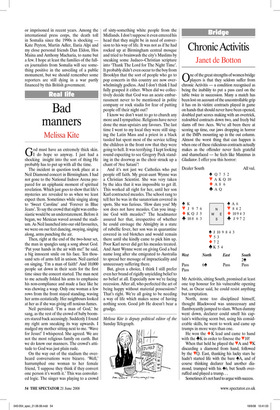On red alert
Aidan Hartley
‘Yaes!’ I’ll answer the phone in a falsettoScottish accent. ‘Can ae help yay?’ If the voice is unfamiliar I lapse into Gaelic and slam down the receiver. This is my strategy for tackling a new wave of death threats being made against me. I have also taken to wearing funny hats, a stick-on moustache and a pirate’s eyepatch. Sometimes I will only leave the house in a burqa.
The threats are real and I take them seriously, though I am only joking about the disguises. I wish I could become an accountant and live in Plymouth, but it’s too late now. I am a hack. But my life has been on red alert since last month’s broadcast of my documentary about the bloodthirsty rule of Somalia’s government, financed by this Labour government using British taxpayers’ money. I’ve been told to beware of carjackings and house break-ins. I get another message that says ‘the monsters are planning to hire a hit squad to get rid of you for exposing them to the world. Watch out, my friend.’ Incredibly, these threats are being attributed to Somali leaders who hold European Union passports. These men have homes and families in the UK and they regularly pass through Heathrow. Britain was kind enough to give them asylum years ago when they claimed to be victims of conflict, before they began commuting back to wage war in Africa. The UK government even pays their personal salaries, while their families enjoy state benefits back in Birmingham, Leicester and London.
My hour-long documentary gathered on-camera witness testimonies inside Mogadishu from victims listing allegations against these UK-backed leaders of mass killings, torture, false imprisonment and extortion. The city is so dangerous due to the fighting that British government officials never dare visit Mogadishu themselves to monitor where UK aid money is being spent. But when the TV programme’s findings were raised in the House of Commons on 11 June, the response by the Foreign & Commonwealth Office’s Meg Munn shrugged this off by taking a swipe at the media. ‘Reporting is often biased and may be exaggerated to exert influence on the international community,’ she said. Nice one.
While trying to track down the warlords in Leicester the other day, one of the leader’s family members started threatening a Somali colleague accompanying me. They also snapped a photo of him on a mobile phone. We later discovered his picture was being circulated among the warlord’s tribes men in Britain. I got my first death threat from a Somali warlord 15 years ago in a rubble-filled Mogadishu street resounding with gunfire. Now you can be menaced by Somalis using phone cameras in Leicester. That is globalisation for you.
These latest threats come in the same week as the unveiling in London of a sculpture in tribute to journalists killed in the line of duty. The monument is a ten-metre glassand-steel cone that sits above the BBC’s Broadcasting House and will be illuminated every evening at 2200 GMT. The United Nations chief Ban-Ki Moon, who led the opening ceremony, said the sculpture was also dedicated to surviving journalists who risk their lives ‘to report what they uncover in the face of deadly threats’. I have to say the existence of a glass ‘shaft of light’ over the BBC does not really make me feel any better about being ‘got rid of’.
I cheered up slightly when I noticed that the ‘glass cone’ more closely resembles a stack of tumblers waiting for a big round of vodkas. And in light of this the sculpture’s title, ‘Breathing’, has an unintended significance for me. I am reminded of the seriously alcoholic breathing of many a correspondent friend, notably Brian Tetley — who died with Mohamed Amin in an Ethiopian Airlines hijack in 1996 and was later buried alongside several bottles of his beloved Tusker beer.
After being blown up by a roadside bomb in Mogadishu I am lucky to be alive, but back in Somalia this is now the worst time ever to be a journalist. The most recent loss was the BBC Somali stringer Nasteh Dahir Farah, murdered a few days ago in the country’s city of Kismayu. Dozens of other Somali journalists have been killed, maimed or imprisoned in recent years. Among the international press corps, the death toll in Somalia since the 1990s is shocking — Kate Peyton, Martin Adler, Ilaria Alpi and my close personal friends Dan Eldon, Hos Maina and Anthony Macharia, to name but a few. I hope at least the families of the fallen journalists from Somalia will see something positive in the unveiling of a public monument, but we should remember some reporters are still dying in a war partly financed by this British government.











































































 Previous page
Previous page